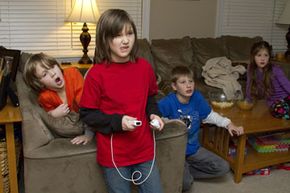Through your controller, you are Link, the valiant adventurer, navigating a virtual icy cave in search of a coveted Heart Piece. In order to uncover the prize, though, you must figure out three of the cave's puzzles consisting of several large blocks of ice. After scratching your head in bewilderment -- and maybe even letting out an exasperated sigh -- you move the blocks in the correct north, east, south and west combinations and hear the sweet sound of victory. You've mastered the challenge, and at last, the Heart Piece is yours!
Solving a difficult video game puzzle is not only exhilarating, but the hard work and knowledge it takes to succeed can make you feel pretty smart, too. The games in the "The Legend of Zelda" series aren't the only ones that can teach life skills like perseverance and critical thinking. Competitive sports games like "Madden NFL" and puzzle-heavy games like "Portal 2" teach kids the importance of good decision-making, planning and communicating effectively. And that's only where the learning begins -- there are numerous video games that are capable of teaching much more.
Advertisement
However, a note for parents: Be careful to pay attention to the Entertainment Software Rating Board's (ESRB) rating of a game before you allow your child to play it. Like movie ratings, the ESRB reviews and rates games according to their content. The ratings are:
- EC (Early Childhood): Games with this rating are suitable for children 3 and older.
- E (Everyone): Games with this rating are suitable for anyone 6 or older.
- E10+ (Everyone 10+): Games with this rating are suitable for anyone 10 or older.
- T (Teen): Games with this rating are suitable for anyone 13 or older.
- M (Mature): Games with this rating are only suitable for persons 17 or older.
- AO (Adults Only): Games with this rating are only suitable for those aged 18 and above.
- RP (Rating Pending): Games with this rating have not yet been reviewed by the ESRB. This rating generally only appears on marketing and advertising for games that have yet to be released.
Click over to the next page to find out which games can improve kids' social interactions and problem-solving skills.
Advertisement



